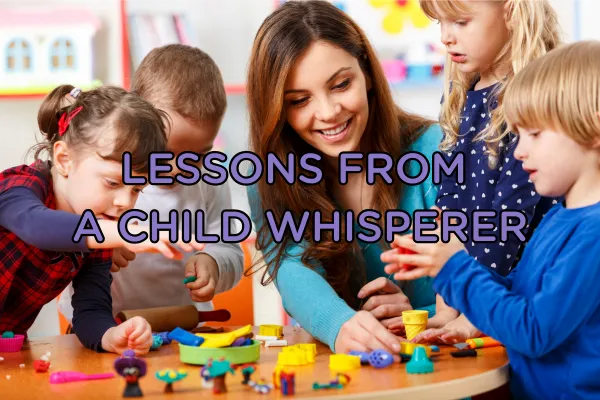General Inquiries: (587) 333-6349 - info@sanostate.com



Lessons from a Child Whisperer: Why Kids Listen to Me (And Not You)
“The line between an annoying kid and a cute kid is determined by your own emotional capacity.” - Allana Shewfelt
People often joke about my talent for getting kids of all ages to like me. I’ve been referred to as the “Child Whisperer” many times.
By parents, teachers, coworkers, and friends, I’ve been told some variations of these phrases:
“You’re SO good with children!”
“I can’t believe they listen to you!”
“My daughter doesn’t talk to anyone, but all day she was telling me she wanted to see you!”
(And my personal favourite:) “Oh, the ‘problem kid’? Yeah, just give ‘em to Allana.”
In truth, I have a lot of experience. I was a gymnastics coach and an assistant dance instructor. I’ve also been a day camp counsellor. I still do community support and respite work. I played Alice (née “In Wonderland”) in an interactive children’s tea party at Heritage Park for two or three years. Most notably, I am an assistant to Psychologists, Occupational Therapists, and Speech Pathologists.
I’ve noticed a number of ways that my interactions with kids differ from their parents. Not all of my strategies are going to be appropriate or feasible for all people in all situations; however, even if you only use one or two of them, you can find yourself developing a much closer relationship. Next week we’ll share the remainder of them, but today I want to focus on the number one reason.
So, why can I connect with young kids so well even though I don’t have any children of my own?
It’s because I don’t have children of my own.
What that really means is I’m not constantly exhausted. I get a break. I get time alone. I can meet my own needs first… Which are privileges that most parents don’t get.
Now, before you jump to selling your kids on the dark web, there will be a key takeaway from all this: Regulate yourself first.
When a child is not listening, annoying, bothering, or misbehaving, I ask, “Is it a ‘them-problem’ or a ‘me-problem’?”
A good way to test this is to consider whether a specific behaviour bothers you all the time and would frankly bother anyone or if it is just frustrating at that moment.
For example, calling “Mommy” one thousand times is pretty much always bothersome, yet it’s also completely normal. It feels like they're not listening, and they don’t acknowledge that you’re doing your own thing. If an adult were calling my name over and over again at any time, I would also feel upset. Thus, it is a ‘them-problem’.
Many “them” problems are mostly developmental, rather than a malicious desire to raise your blood pressure. So what can we do?
It will probably take an equal thousand responses of “Mommy’s talking, please give me a minute” and some coaching before they actually develop the skill to wait. And while that’s frustrating, it’s something we have to accept. So, we must learn to brush it off, keep ourselves cool, and turn frustrations into learning opportunities. Focus on the big picture; this behaviour won’t last forever.
It can be helpful to joke around by modelling the same back to them in a funny way while they’re playing. “Kiddo, Kiddo, Kiddo, Kiddo…. What do I need? Uh…I forgot.” Just be sure to give context after, like, “Doesn’t that feel silly? I can see you’re playing with toys. This time, I’ll try something different to get your attention.” We can help develop waiting skills by giving a specific time on the clock to wait until, asking once and then counting to 10 in your head, or noticing the difference between urgent problems and interesting chats. All of this is best learned through play when you are both calm and collected.
Let’s consider two different examples:
You’re relaxing in your home, drinking coffee; you just woke up from the best sleep of your life. You hear a bump and a bang, and your child starts to cry and yell. How do you meet them? In this case, you have emotional availability. Most parents will check-in, console, see if there is a problem you can solve, and invite them to sit and cuddle with you.
You woke up at 4 am because someone had a nightmare, and then again at 5 to let the dog out, and again at 6 because someone outside thought it would be a fantastic time to start a lawn mower. It’s Saturday, but your fridge is bare. You head to the grocery store; there’s traffic (“On a Saturday?”). Juggling your own things while dodging other carts, an egg falls out of the carton. (“Just what I needed.”) Then, appalled at the prices of vegetables, you try to look at your phone to see what’s cheap and in season, but there’s no wifi or data. At that moment you get a reminder that you have a Neurofeedback appointment in an hour. (“Crap. I forgot.”) At this rate, you’ll be late. You’re tired, stressed, hungry, frustrated. Your child starts to throw a tantrum. (“Don’t you dare you start crying and yelling here! We don’t have time for this! Everyone is watching!”)
The same behaviour in two different contexts can go from expected, manageable, and a part of growing up to disrespectful, unbelievable, and unmanageable. So, when does “crying” become a “tantrum”?
When YOU are stressed.
This is a “you” problem. That means you are dysregulated, have an unmet need, and must care for yourself before you can fully care for them.
Because I don’t have kids of my own, and I’m not their parent, I have a lot of capacity for both little and big things. Overall, this is going to be easier for me. Even in a grocery store, I’m able to leave my cart, move to a quiet area and help a child cry, breathe, and acknowledge their feelings, (the reverse ABCs).
If you’re an overworked parent and you don’t have the emotional capacity for that (which is completely understandable), it’s crucial to acknowledge that it’s because YOU need space to regulate. After you’re calm, you can help them feel calm. Focus on your own feelings, explain, and even apologize where necessary. It’s vital that children know you love them all the time, not just when it’s convenient.
So, a crying and angry child in the store, while you are overwhelmed, what do you do? If possible, give them your full attention, if only for a moment. It doesn't mean succumbing to their whims, say if they're crying for a new toy. But, it does mean honouring your emotions and theirs. They are probably crying for a reason. Did they pinch their finger? Are they hungry too? Are they mirroring your emotions? Is it too loud? Are they feeling scared? Whatever the cause, you just don’t have the capacity to delve into it, so tell them that. “I see you’re really upset. I love you and care about you. I can’t help you right now, because I’m feeling upset too. We can talk and I will help you after we leave the store.”
Will they stop crying? Probably not.
Will they hear you and comprehend? Definitely not the first time.
But those phrases become their inner voice and rationale in the long run.
After you’ve left the chaos, maybe eaten, and gotten settled at home, everyone is feeling a bit more relaxed. That is a good time to acknowledge the thoughts and emotions that arose.
“Remember at the store when Mommy was feeling angry? I had to take some deep breaths to calm down. Sometimes the store can be overwhelming.
You were crying at the store too. How did you feel?”
Again, it might not prevent another breakdown in the Costco parking lot, but you’d be surprised at how far a little acknowledgement will go.
My big secret to connecting with children is this:
The line between an annoying kid and a cute kid is determined by your own emotional capacity.
It becomes much easier to build a strong relationship if you remember that your kids aren’t out to destroy your patience or free time; they just want your love and attention. Give it to them as much as you can.
Finally, model for them. Show them that it’s okay to take breaks; adults need them too. Model healthy boundaries; 5 minutes of alone time. Model self-care like eating, sleeping, and chatting with friends. Show them that it’s possible to:
Love them all the time.
AND
Honour your own needs.
Want more tips? I'll share additional ways to get kids to like and listen to you next week, and then I'll share my best secrets for connecting with teens the following week.
If this is an area where you or your partner could use additional support, click HERE to connect, or call us at 587-333-6349 💙.
Disclaimer
Our content is for informational and educational purposes and is not a replacement for professional advice, diagnosis, or treatment. If you're facing mental health concerns, please seek help from a qualified professional for personalized guidance. Every individual's situation is unique, so use the information here at your discretion. While we strive for accuracy, the field of psychology is ever-evolving, and our content may not always reflect the latest research. Please prioritize your privacy by avoiding sharing personal information in comments or interactions. Your well-being is our top concern, so use our content for educational purposes, but remember to rely on professionals for your specific needs.
General Inquiries:
Our Locations:
Additional Resources:
About Us:
We strive for excellence in psychological treatment. We are committed to providing professional, caring, innovative, and research-based services.
© 2024 Sano State Taylored Psychology. All Rights Reserved.

